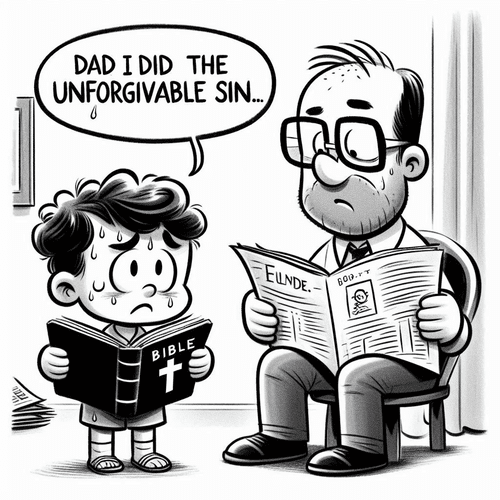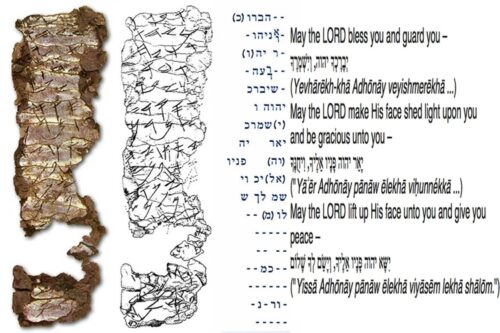The Unpardonable Sin: What is the Blasphemy Against the Spirit?
The unpardonable sin is the severe transgression Jesus warns us about in the gospels (Matthew 12:31-32; Mark 3: 28-29; and Luke 12:10—hover your cursor over the verses to read them). People refer to the sin also as the unforgivable sin, blasphemy against the Holy Spirit, the eternal sin, or even ‘the’ sin. Christians tend to hold one of four views on what this sin entails. Join us as we explore what these four perspectives are:
- Committing severe sins such as adultery, murder, or denying Christ under duress
- Asserting falsehoods about the Holy Spirit
- Attributing Spirit-empowered miracles to Satan
- Decisively rejecting clear truth revealed by the Spirit about Jesus by claiming His works are from Satan—this is the view held by most churches in the Reformed tradition.
Let’s consider each of these views by turn.
View 1: Committing Severe Sins such as Adultery, Murder, or Denying Christ Under Pressure
This view suggests extremely severe sins such as adultery, murder, or denying Christ under persecution are unforgivable. However, this view does not fit the context of Matthew 12, Mark 3, and Luke 12: and is clearly contradicted by the Bible: how can we be sure? King David committed both adultery and murder (2 Samuel 11–12; Psalm 51), Paul persecuted Christians (1 Timothy 1:13), and Peter denied Christ three times (John 18:15–18, 25–27; 21:15–19). Yet, all were forgiven. Genuine Christians continue to sin in various ways, but God forgives those who repent because of Jesus (1 John 2:1).
View 2: Asserting Falsehoods About the Spirit
Early church fathers including Cyril of Jerusalem, believed the unpardonable sin was asserting falsehoods about the Holy Spirit. However, this interpretation is too broad. Many non-Christians and Christians have held incorrect beliefs about the Spirit but later corrected them upon gaining better understanding.
View 3: Attributing Spirit-Empowered Miracles to Satan
This view, favoured by some dispensationalists, limits the unpardonable sin to attributing Jesus’ miracles to Satan. Some argue it could only be committed during Jesus’ ministry or the first century when miracles occurred. However, as DA Carson notes, miracles do not necessarily always indicate the Spirit’s presence and power (Matthew 7:21–23).
View 4: Decisively Rejecting Clear Spirit-Revealed Truth About Jesus by Attributing His Works to Satan
This perspective, held by the likes of John Calvin, suggests the unpardonable sin involves a conscious, deliberate rejection of clear spiritual truth about Jesus, particularly by attributing His miraculous works to demonic forces, rather than the Holy Spirit.
- It’s not an accidental or impulsive act, but a wilful repudiation of truth.
- Those who commit this sin resist God’s truth despite being aware of its validity.
- It involves a persistent, lifelong rejection of Jesus without repentance.
- God may respond by hardening the person’s heart, making repentance impossible.
- Only unbelievers can commit this sin.
This view distinguishes the unpardonable sin from apostasy, though there are similarities:
- Both involve resolute rejection of truth.
- Both result in a state beyond repentance.
- Scriptural passages about apostasy (Hebrews 6:4-6, 10:29; 1 John 5:16) do parallel aspects of the unpardonable sin.
Important considerations:
- It appears unlikely we may ever be able to definitively judge if someone has committed this sin while they’re alive. Only God can know for certain who has committed it.
- Those truly guilty of the sin are typically not concerned about it.
- Worry about having committed ‘the’ sin is thus often a sign one has not done so.
- Moreover, believers in Jesus can rest assured they shall not be condemned (Romans 8:1).
This view emphasises the gravity of repeatedly and knowingly rejecting clear spiritual truth about Jesus, while also offering reassurance to those who maintain faith or show concern for their spiritual state.
Conclusion
Some worry they may have committed the unpardonable sin. Those who are worried if they have, likely have not done so. How do we say so? Well, concern indicates a responsive heart. If you feel remorse for your sins and trust in Jesus, you have not committed the unpardonable sin. Instead of feeling condemned, continue to repent and trust in Jesus, for there is no condemnation for those in Him (Romans 8:1).
Related FAQs
- Can Christians commit the unpardonable sin? Most theologians assure us true believers in Christ cannot commit the unpardonable sin. If we have faith in Jesus and feel remorse for our sins, we have not committed this sin.
- How do I know if I’ve committed the unpardonable sin? If you’re worried about having committed the unpardonable sin, it’s a strong indication that you haven’t. Those who have committed this sin typically show no concern for their spiritual state.
- Is denying Christ under pressure considered the unpardonable sin? No, denying Christ under pressure is not considered the unpardonable sin. The Bible provides examples of forgiveness for such actions, like Peter’s denial of Jesus.
- Can the unpardonable sin be forgiven if someone repents? By definition, the unpardonable sin cannot be forgiven. However, if someone is able to repent and seek forgiveness, it’s a sign they have not committed this sin.
- Can we determine if someone has committed the unpardonable sin? Those who hold the fourth view suggest we cannot definitively judge if someone alive has committed this sin. Only God knows a person’s heart and ultimate spiritual state. Even after death, we can’t be certain, as a person’s final moments are known only to God.
Related Reads
Editor's Pick
The Ketef Hinnom Scrolls: An Accidental Yet Phenomenal Find
SMALLER THAN OUR PALM, OLDER THAN THE DEAD SEA SCROLLS In 1979, a bored 13-year-old volunteer at an archaeological dig [...]

Caught in Adultery: How Reliable Is the John 8 Story?
"Let him who is without sin cast the first stone." Few Bible scenes capture Jesus' wisdom and grace quite like [...]

What Did the Inscription on Jesus’ Cross Really Say?
A REFORMED RESPONSE TO CLAIMS OF GOSPEL CONTRADICTIONS Sceptics love to point out what they see as a glaring contradiction [...]

Biblical and Systematic Theology: Why Do We Need Both?
TWO LENSES, ONE TRUTH Picture this familiar scene: A seminary student sits in the library, torn between two stacks of [...]

The Mysterious Two: Who Are the Anointed Ones in Zechariah?
Picture this: a golden lampstand blazing with light, flanked by two olive trees that pour oil directly into the lamp’s [...]

Regeneration Or Faith? Which Comes First in Salvation?
In the moment of salvation, does God regenerate our hearts first, or do we believe first? How we answer this [...]

Interracial Marriages: Does God Frown On Them?
The question hits close to home for many Christian couples and families today. As our churches become increasingly diverse, believers [...]
‘Because Angels Are Watching’: What Does 1 Corinthians 11:10 Mean?
“For this reason the woman ought to have authority on her head, because of the angels” (1 Corinthians 11:10, ESV). [...]

Why Does God Torment Saul With An Evil Spirit?
Would a holy God send an evil spirit to torment someone? This theological puzzle confronts us in the biblical account [...]

Paul’s Teaching on Women’s Roles: 1 Timothy 2:12 Explained
YARBROUGH’S BIBLICAL CASE FOR COMPLEMENTARIANISM In a world of shifting cultural values, few biblical texts generate as much discussion as [...]
SUPPORT US:
Feel the Holy Spirit's gentle nudge to partner with us?
Donate Online:
Account Name: TRUTHS TO DIE FOR FOUNDATION
Account Number: 10243565459
Bank IFSC: IDFB0043391
Bank Name: IDFC FIRST BANK








